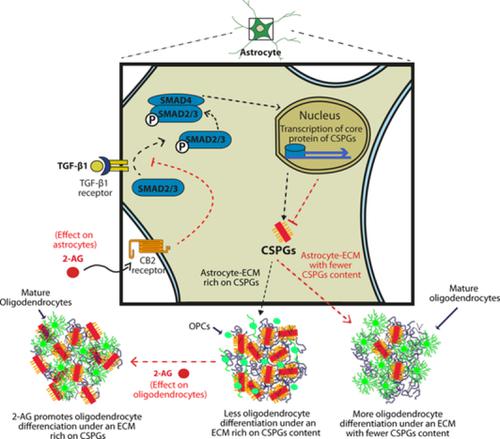Our official English website, www.x-mol.net, welcomes your
feedback! (Note: you will need to create a separate account there.)
2-arachidonoylglycerol reduces chondroitin sulphate proteoglycan production by astrocytes and enhances oligodendrocyte differentiation under inhibitory conditions.
Glia ( IF 5.4 ) Pub Date : 2020-01-02 , DOI: 10.1002/glia.23775 Ana Feliu 1 , Leyre Mestre 1 , Francisco J Carrillo-Salinas 1 , V Wee Yong 2 , Miriam Mecha 1 , Carmen Guaza 1
Glia ( IF 5.4 ) Pub Date : 2020-01-02 , DOI: 10.1002/glia.23775 Ana Feliu 1 , Leyre Mestre 1 , Francisco J Carrillo-Salinas 1 , V Wee Yong 2 , Miriam Mecha 1 , Carmen Guaza 1
Affiliation

|
The failure to remyelinate and regenerate is a critical impediment to recovery in multiple sclerosis (MS), resulting in severe dysfunction and disability. The chondroitin sulfate proteoglycans (CSPGs) that accumulate in MS lesions are thought to be linked to the failure to regenerate, impeding oligodendrocyte precursor cell (OPC) differentiation and neuronal growth. The potential of endocannabinoids to influence MS progression may reflect their capacity to enhance repair processes. Here, we investigated how 2-arachidonoylglycerol (2-AG) may affect the production of the CSPGs neurocan and brevican by astrocytes in culture. In addition, we studied whether 2-AG promotes oligodendrocyte differentiation under inhibitory conditions in vitro. Following treatment with 2-AG or by enhancing its endogenous tone through the use of inhibitors of its hydrolytic enzymes, CSPG production by rat and human TGF-β1 stimulated astrocytes was reduced. These effects of 2-AG might reflect its influence on TGF-β1/SMAD pathway, signaling that is involved in CSPG upregulation. The matrix generated from 2-AG-treated astrocytes is less inhibitory to oligodendrocyte differentiation and significantly, 2-AG administration directly promotes the differentiation of rat and human oligodendrocytes cultured under inhibitory conditions. Overall, the data obtained favor targeting the endocannabinoid system to neutralize CSPG accumulation and to enhance oligodendrocyte differentiation.
中文翻译:

2-花生四烯酸甘油减少星形胶质细胞产生的硫酸软骨素蛋白聚糖,并在抑制条件下增强少突胶质细胞分化。
髓鞘再生和再生失败是多发性硬化症 (MS) 恢复的关键障碍,导致严重的功能障碍和残疾。在 MS 病变中积累的硫酸软骨素蛋白聚糖 (CSPG) 被认为与再生失败、阻碍少突胶质细胞前体细胞 (OPC) 分化和神经元生长有关。内源性大麻素影响 MS 进展的潜力可能反映了它们增强修复过程的能力。在这里,我们研究了 2-花生四烯酸甘油 (2-AG) 如何影响培养中星形胶质细胞产生的 CSPGs 神经聚糖和短肽聚糖。此外,我们研究了 2-AG 是否在体外抑制条件下促进少突胶质细胞分化。在用 2-AG 处理或通过使用其水解酶抑制剂增强其内源性张力后,大鼠和人 TGF-β1 刺激的星形胶质细胞产生的 CSPG 减少。2-AG 的这些作用可能反映了其对 TGF-β1/SMAD 通路的影响,该通路与 CSPG 上调有关。由 2-AG 处理的星形胶质细胞产生的基质对少突胶质细胞分化的抑制作用较小,并且显着地,2-AG 给药直接促进了在抑制条件下培养的大鼠和人类少突胶质细胞的分化。总体而言,获得的数据有利于靶向内源性大麻素系统以中和 CSPG 积累并增强少突胶质细胞分化。2-AG 的这些作用可能反映了其对 TGF-β1/SMAD 通路的影响,该通路与 CSPG 上调有关。由 2-AG 处理的星形胶质细胞产生的基质对少突胶质细胞分化的抑制作用较小,并且显着地,2-AG 给药直接促进了在抑制条件下培养的大鼠和人类少突胶质细胞的分化。总体而言,获得的数据有利于靶向内源性大麻素系统以中和 CSPG 积累并增强少突胶质细胞分化。2-AG 的这些作用可能反映了其对 TGF-β1/SMAD 通路的影响,该通路与 CSPG 上调有关。由 2-AG 处理的星形胶质细胞产生的基质对少突胶质细胞分化的抑制较小,并且显着地,2-AG 给药直接促进了在抑制条件下培养的大鼠和人类少突胶质细胞的分化。总体而言,获得的数据有利于靶向内源性大麻素系统以中和 CSPG 积累并增强少突胶质细胞分化。
更新日期:2020-01-02
中文翻译:

2-花生四烯酸甘油减少星形胶质细胞产生的硫酸软骨素蛋白聚糖,并在抑制条件下增强少突胶质细胞分化。
髓鞘再生和再生失败是多发性硬化症 (MS) 恢复的关键障碍,导致严重的功能障碍和残疾。在 MS 病变中积累的硫酸软骨素蛋白聚糖 (CSPG) 被认为与再生失败、阻碍少突胶质细胞前体细胞 (OPC) 分化和神经元生长有关。内源性大麻素影响 MS 进展的潜力可能反映了它们增强修复过程的能力。在这里,我们研究了 2-花生四烯酸甘油 (2-AG) 如何影响培养中星形胶质细胞产生的 CSPGs 神经聚糖和短肽聚糖。此外,我们研究了 2-AG 是否在体外抑制条件下促进少突胶质细胞分化。在用 2-AG 处理或通过使用其水解酶抑制剂增强其内源性张力后,大鼠和人 TGF-β1 刺激的星形胶质细胞产生的 CSPG 减少。2-AG 的这些作用可能反映了其对 TGF-β1/SMAD 通路的影响,该通路与 CSPG 上调有关。由 2-AG 处理的星形胶质细胞产生的基质对少突胶质细胞分化的抑制作用较小,并且显着地,2-AG 给药直接促进了在抑制条件下培养的大鼠和人类少突胶质细胞的分化。总体而言,获得的数据有利于靶向内源性大麻素系统以中和 CSPG 积累并增强少突胶质细胞分化。2-AG 的这些作用可能反映了其对 TGF-β1/SMAD 通路的影响,该通路与 CSPG 上调有关。由 2-AG 处理的星形胶质细胞产生的基质对少突胶质细胞分化的抑制作用较小,并且显着地,2-AG 给药直接促进了在抑制条件下培养的大鼠和人类少突胶质细胞的分化。总体而言,获得的数据有利于靶向内源性大麻素系统以中和 CSPG 积累并增强少突胶质细胞分化。2-AG 的这些作用可能反映了其对 TGF-β1/SMAD 通路的影响,该通路与 CSPG 上调有关。由 2-AG 处理的星形胶质细胞产生的基质对少突胶质细胞分化的抑制较小,并且显着地,2-AG 给药直接促进了在抑制条件下培养的大鼠和人类少突胶质细胞的分化。总体而言,获得的数据有利于靶向内源性大麻素系统以中和 CSPG 积累并增强少突胶质细胞分化。











































 京公网安备 11010802027423号
京公网安备 11010802027423号